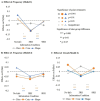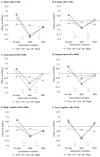The number of available sample observations modulates gambler's fallacy in betting behaviors
- PMID: 39775099
- PMCID: PMC11706941
- DOI: 10.1038/s41598-024-84929-5
The number of available sample observations modulates gambler's fallacy in betting behaviors
Abstract
The gambler's fallacy is a prevalent cognitive bias in betting behaviors, characterized by the mistaken belief that an independent and identically distributed random process exhibits negative serial correlation. This misconception often arises when individuals observe a series of realized outcomes from the process. We study how varying the quantity of information about the sample of realized outcomes influences individuals' propensity towards the gambler's fallacy in repeated betting. Experimentally, we uncover compelling evidence of the gambler's fallacy and its counterpart, the hot-outcome fallacy, associated respectively with the frequency and duration of consecutive outcomes within the observed sample. While an increase in the number of sample observations marginally heightens the inclination towards the gambler's fallacy with low winning probabilities, the effect is strikingly different when the likelihood of winning is 50% or more. In these cases, a small sample significantly exacerbates the gambler's fallacy, whereas a larger sample substantially diminishes its impact. Furthermore, we identify individual variations in response to changes in information, influenced by factors such as gender, experience in lottery participation, and cognitive ability. Our findings underscore the sensitivity of gambling fallacies to contextual factors in decision-making, illustrating how the interplay of these factors modulate fallacious betting behaviors.
Keywords: Gambler’s fallacy; Hot-outcome fallacy; Information provision; Repeated gambling.
© 2025. The Author(s).
Conflict of interest statement
Declarations. Competing interests: The authors declare no competing interests.
Figures





References
-
- Tversky, A. & Kahneman, D. Belief in the law of small numbers. Psychol. Bull.76(2), 105 (1971). - DOI
-
- Clotfelter, C. T. & Cook, P. J. The “gambler’s fallacy” in lottery play. Manag. Sci.39(12), 1521–1525 (1993). - DOI
-
- Lien, J. W. & Yuan, J. The cross-sectional “Gambler’s Fallacy”: Set representativeness in lottery number choices. J. Econ. Behav. Organ.109, 163–172 (2015). - DOI
Grants and funding
LinkOut - more resources
Full Text Sources

